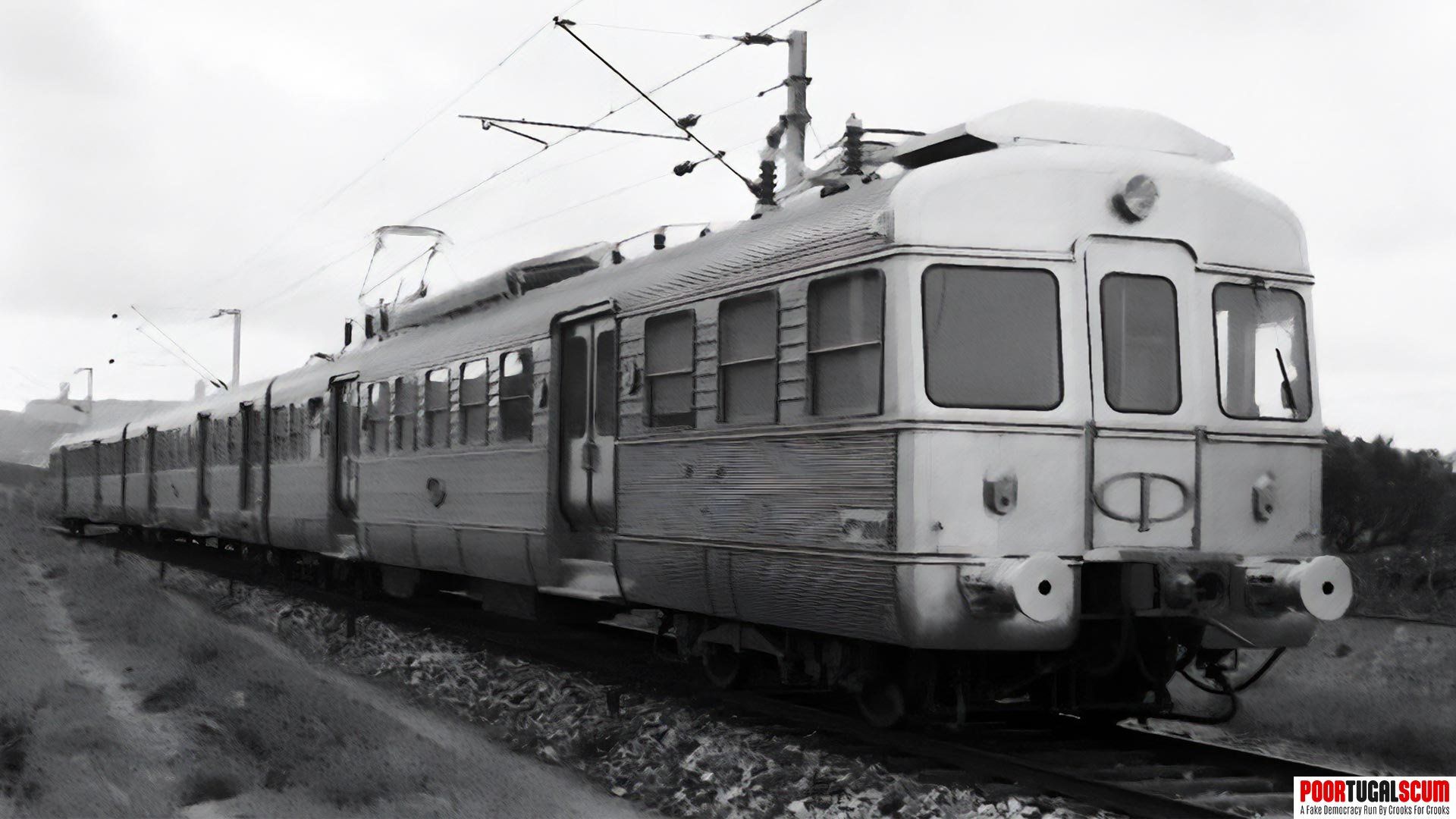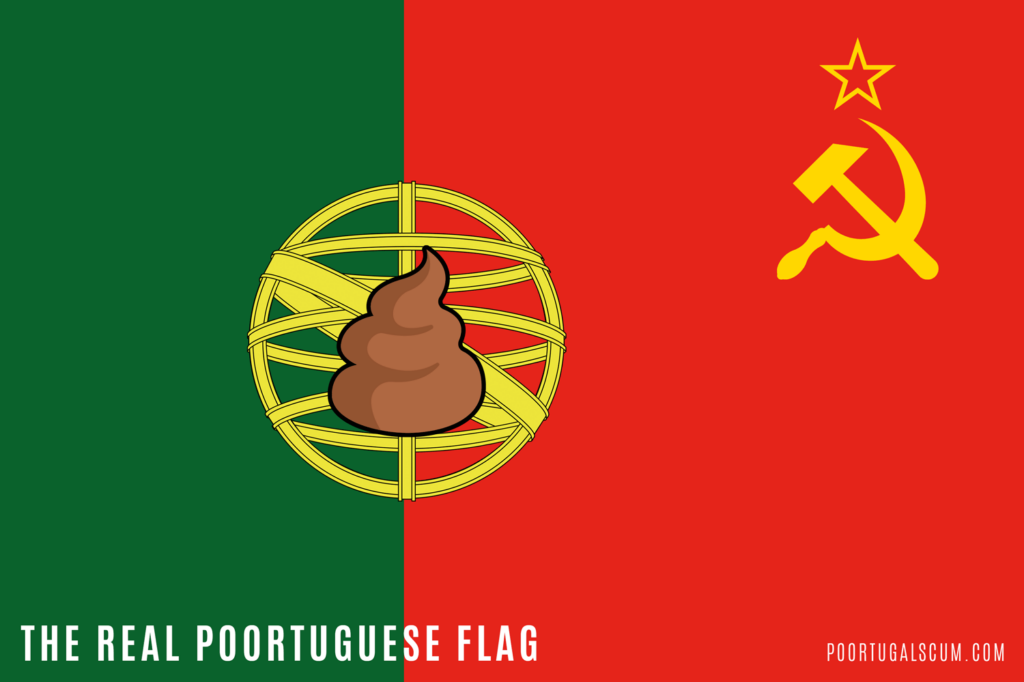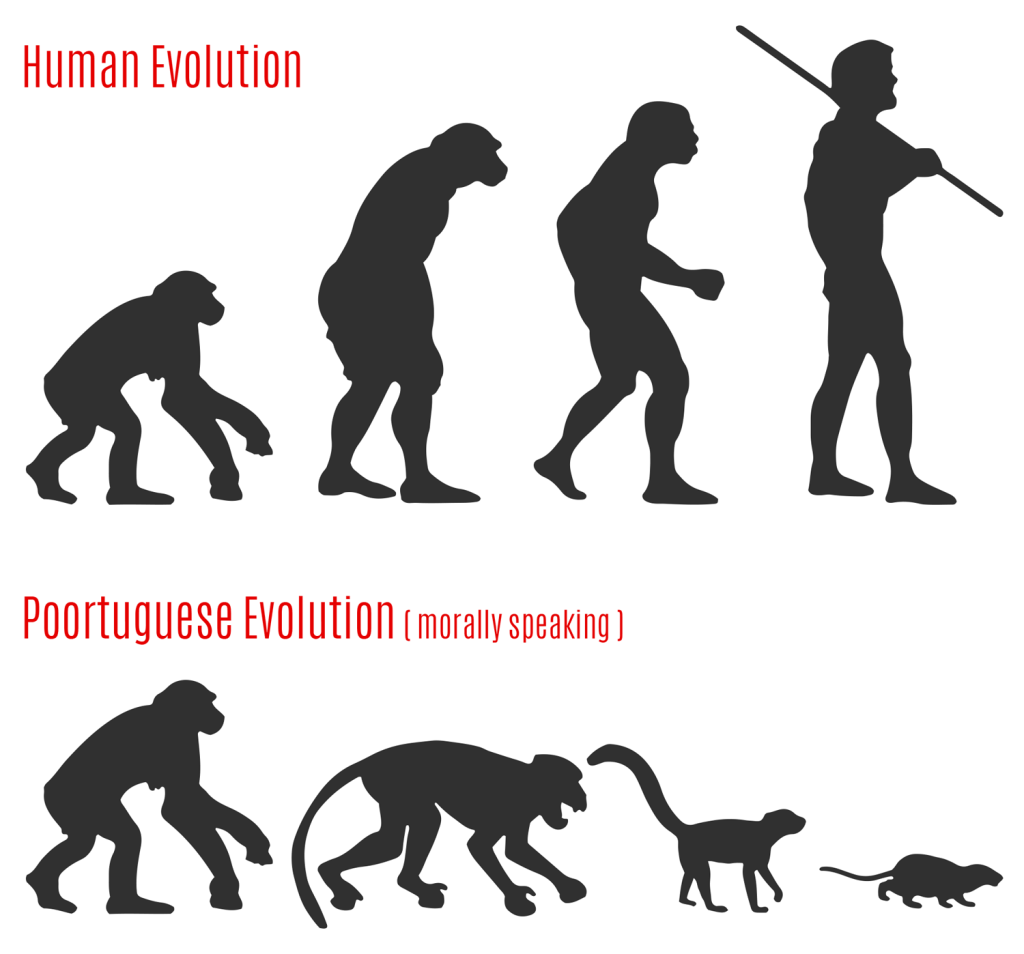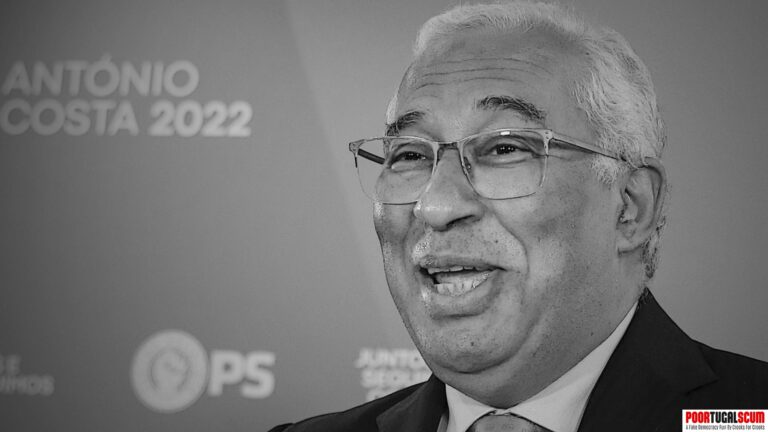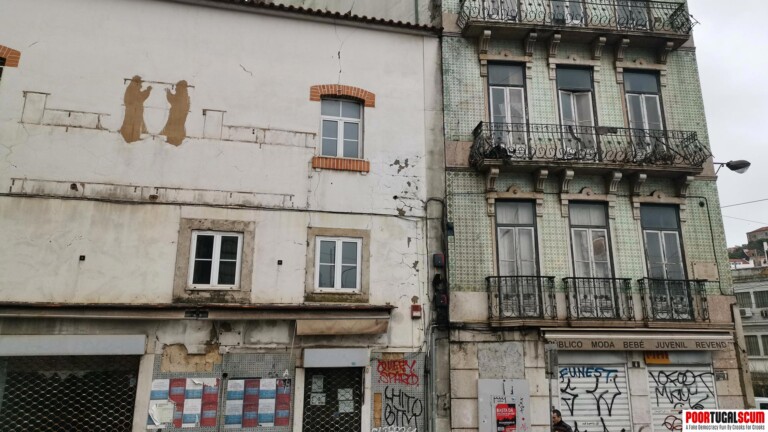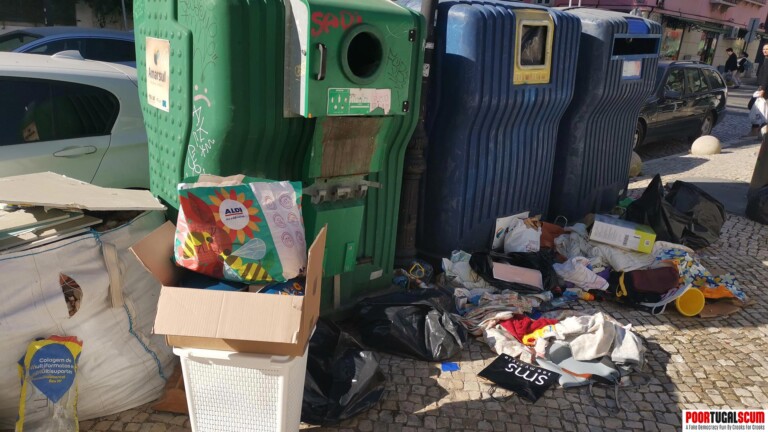Portugal is an eternally postponed country.
Nothing ever goes the right way in Portugal because the interests of the countless corrupt always come first. Obviously, Portugal is not only not converging with the EU as it should, it is actually diverging, and at an exponential rate. Moreover, all Portuguese are certainly paying the very high cost of this situation, which is increasingly impoverishing them financially and consequently in everything else, for the sole benefit of those who are stealing the country and wounding it to death.
What the successive corrupt Portuguese governments are doing to the country, with total impunity, is the most criminal thing that can happen, because they are condemning the population and whole generations to a future of poverty, isolation and ignorance. Lamentably, most Portuguese are not even aware or capable of understanding the enormous damage being done to them.
The following article is a translation (mostly MT). You can find the link to the original website at the end of it.
Open letter:
Railroad, lever of economic development
The Government presented its National Railway Plan with the express aim of obtaining the greatest support from the Portuguese and the Assembly of the Republic. As explained below, it does not and will not have the support of the subscribers of this open letter, who for several years have been fighting to sensitize the European Union and the President of the Republic, who then received us and to whom we delivered the Manifesto “Portugal – A Railway Island in the European Union” into which the country was (and continues) to transform, explaining the seriousness for the Portuguese economy of the strategy on which the PFN is based, currently under public discussion.
Likewise, for years we have been trying to sensitize the Government, the Assembly of the Republic and the parties to the reality that the railway policy of the last decade and the PFN do not comply with, rather oppose, the European objectives of railway interoperability (the completion of the network is regulated by 2030, with no technical obstacles to the circulation of trains of all nationalities in all EU countries). Objectives defined by the European Union and required by the needs of the Portuguese economy, namely the export sectors, of which we highlight the companies represented by AFIA (Association of Manufacturers for the Automotive Industry) responsible for 6% of GDP. It should be noted that 70% of our exports are to Europe and of these 80% (in value) are made by road, which is an unsustainable model for environmental and energy reasons, in addition to being condemned by the European Union.
The negative effects of these policies are also visible in the ability to attract investment, while in Spain the growth of foreign investment is very visible (more than 30.000 million euros recently announced), the attraction of foreign investment in Portuguese industry has a slower pace and does not create conditions for the permanence in Portugal of international production centers that generate added value linked to relevant sectors of global industry and crucial in the European reindustrialization process. These are factors that negatively influence the wealth produced and the growth of the economy, with the consequent non-creation of new jobs, loss of existing jobs, reduction in the purchasing power of wages and pensions and taxes available to finance the SNS, the public school and public services in general,
that is, it impoverishes and worsens the living conditions of the Portuguese people.
The Railway Plan now presented by the Government is a homegrown plan, not interoperable with the rest of Europe, designed to prevent European railway competition from entering Portugal,
an objective already expressed by previous Ministers of Infrastructure when protecting domestic railway monopolies and, mainly, by condemn Portuguese exports to dependence on the logistics centers that Spain has created along our border and in the Basque Country. It is a plan that has barely started and is already two years behind schedule, and that ignores new advances in world rail technology, namely the transport of trucks and semi-trailers of goods on railway platforms, as has been done in Europe for years,
a plan that deceives the Portuguese about the concept of high speed and continues to bet on the road transport of goods to Europe, which will be less and less competitive.
In addition, contrary to what has been done in the neighboring country and in the countries of Eastern Europe, in order to adapt their railways to the connection between all the countries of the European Union, as supported by Brussels with hundreds of billions of euro, the The Portuguese government proposes to invest in the so-called modernization of our 19th century railway, always and only in Iberian gauge, with the promise that in the future (which is now 2050) it will make new investments again, with a view, finally, to the adoption of the gauge European.
It is an egocentric vision of duplication of investments, which, being very high, are meant to last for many years, probably a century and not the twenty years foreseen in this government plan.
And until then, our economy is losing competitiveness and the country is becoming impoverished.
Wouldn’t it be preferable to anticipate our interoperability, instead of postponing it?
The official strategy, despite confident declarations of exemptions from the mandatory UIC gauge and a 3-year bonus for assessing feasibility and drawing up a migration plan, as provided for in the revision of current regulations, runs the risk of making Portugal, for lack of credible projects, losing EU support for investments in the European gauge railway network (which can reach around 70% of the amount to be invested). Such support is granted by the new CEF-2 program for the 2021-2027 period, which for the Transport area, it amounts to €25.81 bn (billion), which includes €11.29 bn (billion) reserved for Cohesion Fund beneficiary countries, such as Portugal. There is still no official confirmation, as of December 22, 2022, of obtaining EU funds for the Lisbon-Porto line in Iberian gauge in the application phase that ends on January 18, 2023 .
It should be noted that in the period 2014-2020 the Portuguese government expected to raise 1.250 million euros from CEF-Geral (funds allocated based on the quality of projects) and did not even manage to raise an eighth of that amount. But the PFN confirms the previous strategy, highlighting the fragility of the projects as they are single-track with Iberian gauge on the two international traffic lines of the “core” network,
making interoperability and exports of goods difficult and consequently affecting economic growth.
As for passenger projects, the PFN refers to the UIC gauge after 2050. It’s not what the binding regulations say (2030) or the predictable guideline to ban flights of less than 500km. Will the Portuguese government be able to circumvent European “guidelines” and obtain funding for the Lisbon-Porto line?
In summary, this National Railway Plan, in its retrograde and nationalist view, is a plan out of its time, it does not fulfill any of the objectives defined by the European Union,
which are after all global objectives, from Europe to China, of reducing the consumption of fossil energies, the replacement of road transport of goods and passengers by rail, the elimination of air transport for distances of less than a thousand kilometers and the ongoing limitation of individual transport in favor of collective transport, not only at the national level but globally.
In life there are rarely two opportunities to do the right thing.
Unfortunately, the governments of Portugal insist on doing what is wrong, which is the reason for the stagnation of the Portuguese economy over the last twenty years and the impoverishment of our fellow citizens
who, for some reason, do not see alternatives for their lives in Portugal. Many of us have been warning governments and institutions about this for years, without considering the opinions of companies and entrepreneurs, who generate wealth.
We end with an appeal to the President of the Republic and the Assembly of the Republic, to whom we have already made known the errors and limitations of the Government’s ideas, to promote a national debate on the plan, a true free and consequential debate, instead of the usual sessions organized by the Government and by the IP company for the usual speakers, some of whom defended the use of the UIC gauge under previous governments and now defend the maintenance of the Iberian gauge.
With best regards to Your Excellencies
Lisbon, January 23, 2023
The signatories
Amaro Reis President of APIP – (Portuguese Plastics Industry Association)
António Andrade Tavares – Eng. Electrician, Manager of Renova – Fábrica de Papel do Almonda
António Poças da Rosa – Businessman, President of NERLEI (Business Association of the Region of Leiria)
Carlos Cardoso – President of ANIMEE (Portuguese Association of Electric and Electronic Companies)
Fernando Castro – President of AIDA (Industrial Association of the District of Aveiro)
Jorge Pais – President of NERPOR-AE (Business Association of the Region of Portalegre)
Jorge Santos – Businessman, CEO of Vipex
José António Barros – Engineer, President of the General Assembly of AEP
More related news
Railway and Competition (opinion article)
I draw the attention of all Portuguese people and, mainly, of the institutions with responsibilities for the future of Portugal, that a Government Rail Plan is in progress that seriously jeopardizes the foreseeable future of the Portuguese economy and, in particular, the exporter sector. Reason why I encourage everyone to participate in this public discussion, which will be the least we can do for our country.
opinion article by Comendador Henrique Neto, 11-22-2022
It so happens that the Government, in defense of some national monopolies, such as CP and the foreign company Medway, has been refusing to invest in the railroad in UIC (European) gauge, saying now that it will do so by 2050, and by that time the Portuguese economy will be controlled by Spanish competition, as the different governments have already allowed to happen with the banking system. Let’s see this in detail:
1. Competition
The government has claimed that maintaining the Iberian gauge on the Portuguese railway protects us from competition from European railway companies, which will therefore not enter Portugal. True, but this position goes against all the rules of the European economy, makes rail transport costs higher for national exports and, even more serious, makes their transport dependent on the platforms that Spain already has along the border, or that is, our biggest competitors.
2. Foreign investment
It is happening that foreign investment in the industry is already choosing Spain, given the existence of ports that allow connection to other continents and the European gauge railway that allows connection to the whole of Europe. Investments in Spanish industry worth twenty billion euros in the Valencia region were recently announced, precisely for this reason.
Moreover, it will not be possible to maintain the factories of AutoEuropa and Stelantis (Peugeot and Opel) in Portugal without a UIC gauge railway and these companies, like others, will not wait for 2050.
3. Railway investment
The Government is investing (little and with appalling slowness, in addition to the delays of many years) in our 19th century railway and promises to invest in the future in a new line from Lisbon to Porto and from there to Vigo, but in the Iberian gauge, putting the Government on the hypothesis that by 2050 the gauge will change to UCI. In other words, in investments that, because they are very high, must be made to last a century, the Government plans investments for thirty years, to invest a second time and in duplicate, with costs that will be higher later and when the European Union does not have the subsidies of more than 50% that exist now.
4. Technology
The Government and some of the technicians whom the Government pays (during the governments of José Sócrates they defended the UIC gauge on the line to Spain from Poceirão to Caia) now claim that there is no problem with the UIC gauge, and whatever they call it a variable axle system, but, unfortunately, they don’t say: that it is an expensive system, that it only has a Spanish manufacturer, which clearly says it is a technology to facilitate the transition from the Iberian gauge to the European gauge in Spain. If this system were a solution to the problem of the difference in gauge between the Iberian peninsula and Europe, Spain, which has been using this system for over 50 years for passenger trains, would have realized it by now and would not invest every year billions of euros on the European gauge rail network.
Furthermore, no European operator will use a non-standard system to reach a small economy of ten million inhabitants on the edge of Europe.
In other words, we are back to the same thesis of the Government about the advantage, in terms of competition, of the Portuguese isolation in Europe. In addition, in this way the Government refuses the future, which is the new technology of door-to-door transport of goods across Europe, by placing trucks on railway platforms.
In summary, the Government’s railway policy, now under public discussion,
represents a crime against the Portuguese economy and against the wages and standard of living of the Portuguese in the future,
which is not reversible after the loss of possible investments at this time. In addition to an incomprehensible denial of the economic and logistical policies of the entire European Union. I hope that the Portuguese do not accept being part of this crime, because, ultimately, that is what it is all about.

